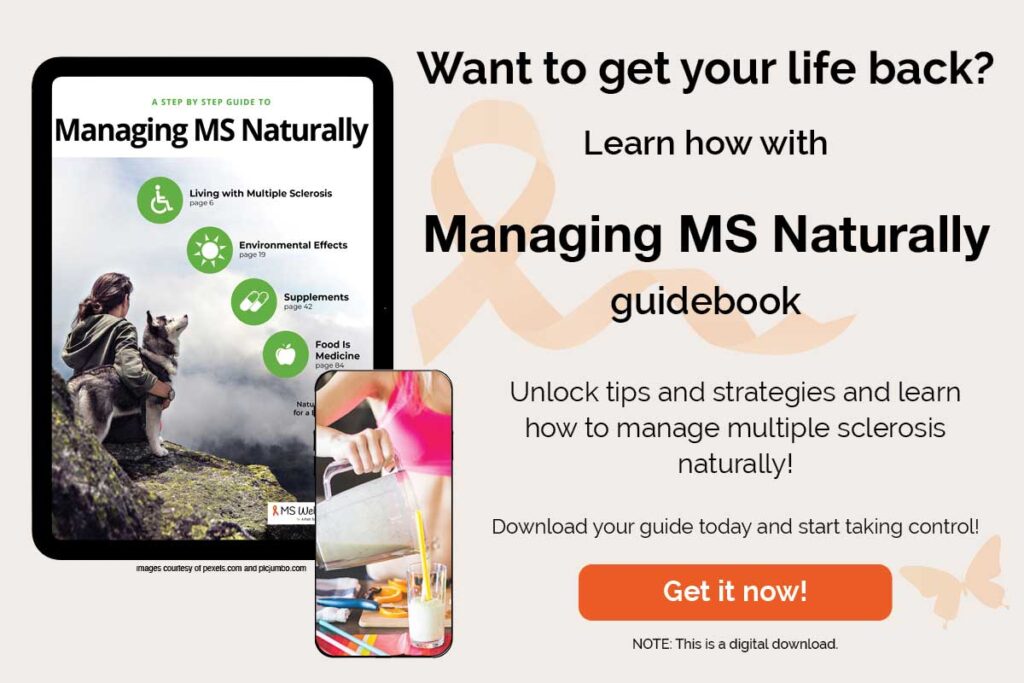Last Updated on August 5, 2024 by Cathy

Two scary words – “multiple sclerosis” (MS). Living with MS is hard, it changes your life in big ways. Doctors say there’s no cure, which can make you feel helpless. It’s known as an autoimmune disease where the body attacks itself, and the cause is unknown. Not knowing the cause means no cure. Drug modifying therapies (DMT) aren’t a cure either. If they work, they only slow the disease progression. Plus, they come with nasty side effects, including other autoimmune diseases – yeah, really.
Here’s something you might not know – MS is caused by environmental toxins.
Yep, you read that right. “Environmental” toxins!
A 20-year study found Epstein-Barr virus (EBV) is the main cause of MS. However, 95% of the world’s population has EBV and only a small percentage has MS. That proves, there are other factors involved.
MS happens because of your environment which includes:
- Diet and lifestyle
- Stress
- Infections
- Household toxins
- Toxic body care products
- Heavy metals
Stress – I know, I already mentioned stress but it plays a BIG role.
So why do a small percentage of people get MS?
The truth is, it’s due to how you live your life. An EBV diagnosis happens about 5-10 years before a person’s first MS symptom. During that 5-10 year span, what happened? Why did you get MS, and the majority of people also infected with EBV didn’t? How were you living your life that led to your MS?
I’m not blaming you; no one purposely wants to get MS. But when it comes to health, our society promotes diseases. Our jobs are stressful. We eat highly processed foods because they’re cheaper. We come home from work exhausted and become couch potatoes watching TV all night. Everything in our house, from the furniture to the clothes we wear, is full of toxic chemicals.
You got MS because your body is overloaded with toxins!
Stay Healthy By Eating Healthy

Image by drobotdean on Freepik
There’s a quote by Heather Morgan: “Every time you eat or drink, you are either feeding disease or fighting it.” It is true! What did you have for breakfast this morning? Cereal with milk, toast with butter, or maybe a donut. When was the last time you ate a papaya, melon, or a bowl of berries for breakfast?
Everything you put in your mouth affects more than you realize such as:
- Digestive health
- Fatigue
- Gut health
- Mental health
- Mood
- Muscle strength and flexibility
- Stronger bones and teeth
- Weight management
Have you ever pigged out on junk food and felt blah afterward? Junk food can upset your digestion and energy, making you feel sick and sluggish.
Foods you need to avoid include:
- Gluten: increases inflammation
- Dairy: causes more flares in people with MS
- Heavily processed foods
- Refined sugar
- Corn, soy, and canola oil: GMO crops (Roundup)
Instead, load up on fruits, vegetables, herbs, and spices. These are the foods that will heal your body. You don’t need to be a vegan but remember, you are what you eat. Conventional red meat contains gluten, growth hormones, and antibiotics. If possible, buy healthy meats but keep your fat intake low to reduce inflammation.
Healthy meats include:
- Wild-caught fish
- Pasture-raised poultry
- Grass-fed and finished meats
- Game meat
Yes, it’s more expensive, but you are trying to heal your central nervous system (CNS). The CNS doesn’t regenerate as quickly or easily as some other tissues in the body. Unlike skin or liver cells, neurons in the CNS have a very limited ability to regenerate.
However, the brain can still heal through neuroplasticity by creating new connections to compensate for lost functions. It’s like training your brain to go around the MS damage.
If you’re worried about what you can eat, just get back to a simple diet. No need to make things complicated. Aim for a high plant-based, high-fiber diet. Look for healthy recipes with very few plant-based ingredients.
Here are some simple ideas:
- Roasted root veggies: roast with olive oil, garlic powder, and red chili pepper flakes
- Spaghetti squash: bake, then add olive oil, onion, garlic, tomato, and basil
- Stir-fry: steam frozen veggies, then add pineapple juice, maple syrup, and ginger powder
So next time you’re tempted to eat that cheeseburger, remind yourself that you’re trying to repair your body.
Drink Lots of Clean Water

Image by gpointstudio on Freepik
People with MS tend to back off from drinking enough water due to bladder issues. While frequent bathroom trips are a concern, staying hydrated is vital for your health. Water keeps your body balanced, aids digestion, and boosts energy. Plus, it flushes out toxins! When you don’t drink enough, you might experience more fatigue and discomfort.
To make it easier to drink more water, try these simple tips:
- Set reminders: Use your phone or a watch to remind you to drink water throughout the day.
- Flavor it naturally: Add slices of fruits like lemon, lime, or cucumber to your water for a refreshing taste.
- Drink small amounts regularly: Instead of trying to drink a lot at once, sip water throughout the day.
Using an app can help track your daily water intake. I use the ‘Health’ app on my iPhone. Below is a screenshot showing my water intake for the past month. As you can see, there were three days when I only drank seven cups. That’s why important to track how much you drink.

A screenshot of my water intake from my “Health” app.
The type of water you drink also matters. City or tap water has chemicals like fluoride and disinfectants. Living in an older house could have rusty pipes that can release heavy metals into the water. Even well water may be contaminated with bacteria or pesticides from a nearby farm field. – If you are on a well, you should get your water tested.
A whole-house water filtration system is best. But, if you can’t afford one, use a water filter like a pitcher or one that attaches to your faucet.
Finding a balance that works for you keeps you hydrated without causing discomfort. Your body will thank you for it!
Lowering Your Toxin Exposure

Reducing toxins in your environment can make a big difference in your health. Many everyday products contain chemicals that can affect your body over time. Here are some simple changes you can make:
- Choose Clean Body Care Products: Many body care items like shampoos, soaps, and lotions have harmful chemicals. Look for products labeled “natural” or “organic” to avoid synthetic ingredients. These products are often gentler on your skin and less likely to contain toxins.
- Switch to Green Cleaning Products: Traditional cleaning products may irritate your lungs and skin with strong chemicals. Instead, choose green cleaning products or make your own. You can use ingredients like vinegar, baking soda, and lemon juice to clean your home safely.
- Wash New Clothes Before Wearing Them: New clothes often come with flame retardants which kill the cells that build myelin. Washing them before you wear them can help remove these substances. This simple step can reduce your exposure to unwanted chemicals.
- Avoid Plastic Food Containers: Plastics, especially when heated, can release toxins. Opt for glass or stainless steel containers for your food and drinks. They are safer and help keep your food free from harmful chemicals.
These small changes can reduce toxin exposure and boost your well-being. It’s about creating a healthier environment, one step at a time.
Understanding and Managing Stress

Image by gpointstudio on Freepik
Stress is a big deal when it comes to MS. Stress is your body’s way of reacting to a challenge or demand. When you have MS, stress can make your symptoms worse and even cause flares. It’s a bit of a cycle: having MS causes stress, and then stress can make your MS worse.
Stress triggers a response in your body that can lead to inflammation and other problems. This can be tough for people with MS, worsening fatigue, pain, and cognitive issues. Haven’t you noticed it’s hard to think when you’re stressed? Long-term stress can also weaken your immune system, making it harder for your body to manage MS.
Reducing stress can help you feel better and manage your MS more effectively. Here are some simple ways to lower stress:
- Practice Deep Breathing. Taking slow, deep breaths can help calm your mind and body. Try to breathe in for four counts, hold for four counts, and breathe out for four counts.
- Stay Active. Gentle exercise like walking, yoga, or stretching can reduce stress. It releases endorphins, which are natural mood boosters.
- Connect with Others. Spending time with friends and family can help you feel supported and less alone. Even a phone call or video chat can make a big difference.
- Set Aside Time for Relaxation. Make time each day to do something you enjoy, whether it’s reading, listening to music, or taking a warm bath.
- Try Mindfulness or Meditation. These practices can help you stay present and reduce anxiety. There are many free apps and online resources to help you get started.
Read my article: The Power of a Positive Mindset
Managing stress improves well-being and helps control MS symptoms. Remember, small steps can lead to big changes. Remember, small steps can lead to big changes.
Reduce MS Symptoms Naturally
Living with MS can be challenging. However, you can reduce MS symptoms naturally by making small changes to your diet, environment, and daily habits. Every effort towards a healthier lifestyle helps you feel better and manage MS.
Stay positive and keep moving forward. You’ve got this!

Discover the Essential Resource for Managing MS Naturally! Click Here to Learn More and Transform Your Health Today!

Want to remember this health tip? Pin it to your Pinterest board!

Image by katemangostar on Freepik
Reduce MS Symptoms Naturally with These Simple Tips





